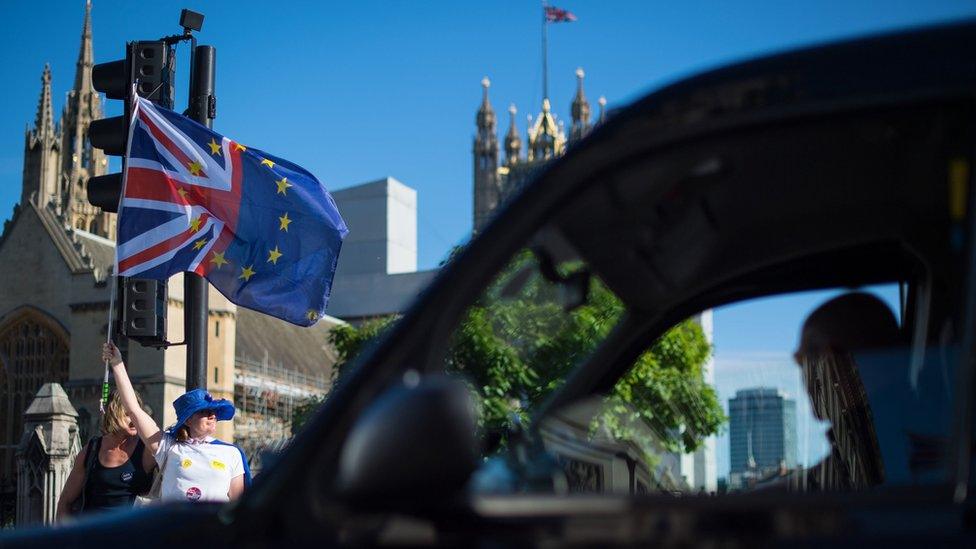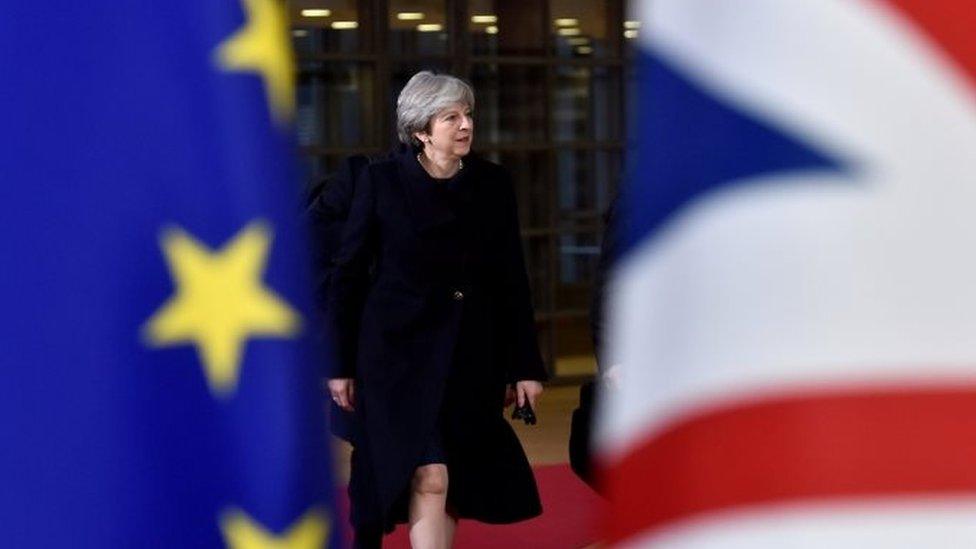Conservative rebels target Theresa May's Brexit plan
- Published

Conservative Eurosceptics have launched a new attempt to change the government's Brexit strategy by targeting a key piece of legislation.
Amendments tabled to the customs bill threaten to undermine Theresa May's plan for future UK-EU relations.
Some Brexiteers are unhappy at the plan, agreed by the cabinet at Chequers last week, saying it will keep the UK tied to EU rules.
The PM says it honours the Leave vote and protects jobs.
With numbers tight in the Commons, the prime minister - who relies on Northern Ireland's DUP to win key votes - would be vulnerable to any rebellion among Eurosceptic MPs as she tries to pass key laws needed for Brexit preparation.
The UK is due to leave the European Union on 29 March 2019, but the two sides have yet to agree how trade will work between the UK and the EU after that.
The delay has been partly blamed on deep disagreements within the Conservative Party over what shape Brexit should take.
This has focused on whether the UK should prioritise business interests and keep a close relationship with the EU in order to minimise friction for cross-border trade - which critics say will mean the UK still abiding by EU rules and leaving "in name only".
The Chequers proposals, which have yet to be negotiated with the EU, prompted the resignations of Boris Johnson, the foreign secretary, and David Davis, the Brexit secretary, who both said they could not support them.

Hitting government where it hurts

Analysis by BBC Political Editor Laura Kuenssberg
Brexiteers are trying to force the government to drop its Chequers compromise, and dangling the threat of voting down legislation if Theresa May doesn't budge.
Brexiteer ministers are this afternoon, I'm told, still trying to get "edits" to the final White Paper, the souped-up version of the Chequers plan.
Their fellow Leavers on the backbenches are clearly going to kick up a stink if Number 10 won't move, and if they choose to, they have the numbers to defeat the government time and again.

More details will be set out on Thursday. So far Downing Street has said it would see the UK agreeing a "common rulebook" with the EU for trading in goods, in an attempt to minimise friction for trade at borders.
This has angered some Conservative backbenchers, who say it will prevent the UK from having its own independent trade policy, and they want to see the Chequers blueprint rewritten.
The customs bill - formally known as the Taxation (Cross-Border Trade) Bill, will give the government the power to adopt a new customs policy after it leaves the EU.
The legislation returns to the Commons on Monday.
One of the Eurosceptic rebel amendments demands that the UK should not be allowed to collect customs duties on behalf of the EU, unless the EU does the same for the UK.
But in the Chequers agreement, there are plans for a "combined customs territory" where the UK would charge EU tariffs for goods which will end up heading into the EU.
Other amendments would make it impossible for Northern Ireland to be in a separate customs arrangement to the rest of the UK - an arrangement previously suggested by the EU - and would require the UK to have a separate VAT regime from the EU.
Jacob Rees-Mogg, who leads the European Research Group of Tory MPs, said the amendment would "put into law the government's often stated position that Northern Ireland should be treated the same way as the rest of the country", and "ensure reciprocity of customs collection, and treating the UK and EU as equals".
"They will put into law the government's stated position that we will not be part of the EU VAT regime," he added.